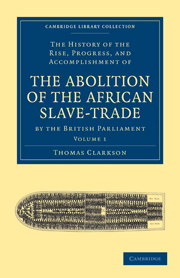Book contents
Summary
I proceed now to the fourth class of forerunners and coadjutors up to the year 1787 in the great cause of the abolition of the Slave-trade.
The first of these was Dr. Peckard. This gentleman had distinguished himself in the earlier part of his life by certain publications on the intermediate state of the soul, and by others in favour of civil and religious liberty. To the latter cause he was a warm friend, seldom omitting any opportunity of declaring his sentiments in its favour. In the course of his preferment he was appointed by Sir John Griffin, afterwards Lord Howard, of Walden, to the mastership of Magdalen College in the University of Cambridge. In this high office he considered it to be his duty to support those doctrines which he had espoused when in an inferior station; and accordingly, when in the year 1784 it devolved upon him to preach a sermon before the University of Cambridge, he chose his favourite subject, in the handling of which he took an opportunity of speaking of the Slave-trade in the following nervous manner:—
“Now, whether we consider the crime, with respect to the individuals concerned in this most barbarous and cruel traffic, or whether we consider it as patronized and encouraged by the laws of the land, it presents to our view an equal degree of enormity. A crime, founded on a dreadful preeminence in wickednessA crime, which being both of individuals and the nation, must must sometime draw down upon us - the heaviest judgment of Almighty God, who made of one blood all the sons of men, and who gave to all equally a natural right to liberty ; and who, ruling all the kingdoms of the earth with equal providential justice, cannot suffer such deliberate, such monstrous iniquity, to pass long unpunished.”
- Type
- Chapter
- Information
- The History of the Rise, Progress, and Accomplishment of the Abolition of the African Slave-Trade by the British Parliament , pp. 203 - 217Publisher: Cambridge University PressPrint publication year: 2010First published in: 1808

